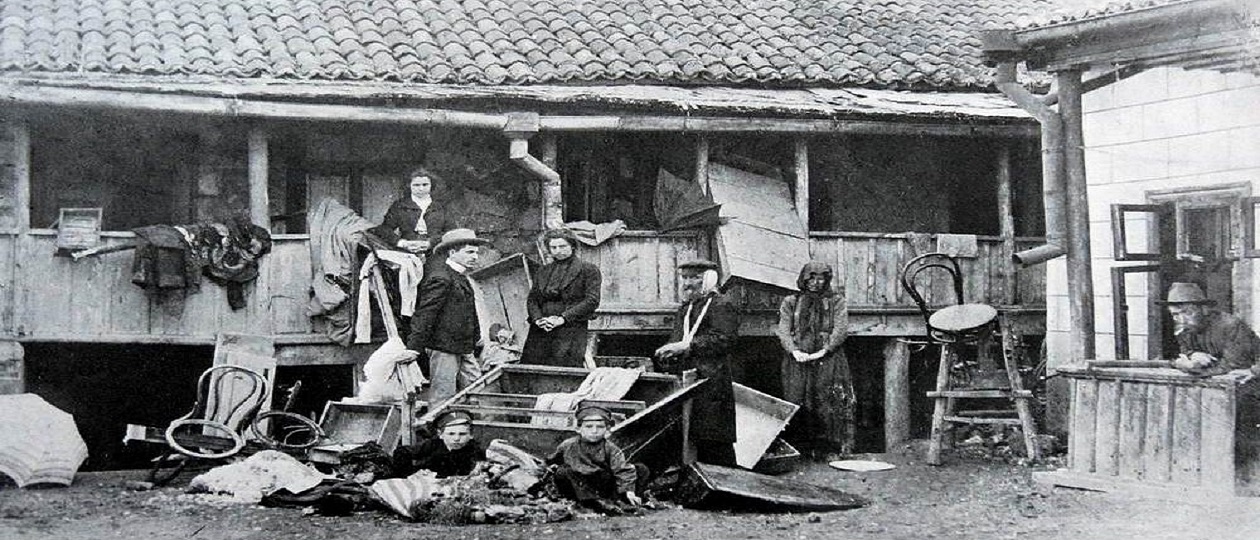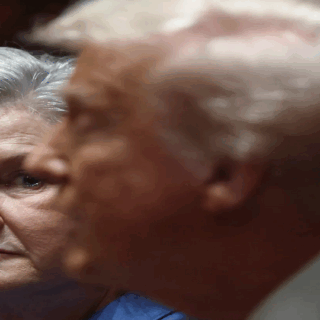
One of the darkest chapters in the history of the People’s Will [Народная Воля] was how some narodovol’tsy supported a wave of anti-Jewish pogroms [погромы] in 1881-1882 in the southern and southwestern provinces, now forming part of Ukraine.
A pogrom is a mob attack direct against certain categories of people, considered evil alien elements by the perpetrators involving destruction of property and human life. Certain members of the People’s Will regarded the pogroms as the first step toward a people’s revolution because the peasants were attacking one group of exploiters who just happened to be Jewish. Revolutionaries hoped that peasants would attack other groups of exploiters and the government.
The events of 1881-1882 mark a milestone in the history of left-wing antisemitism. Hatred of Jews existed for centuries in Europe, but it was based usually on religious reasons. Millions of Christians believed that Jews had killed Jesus Christ and therefore deserved to suffer.
Antisemitism is a new form of hatred of Jews and was the result of the huge changes in Europe caused by the French and other revolutions and the Industrial Revolution. Right-wing antisemites blamed Jews for bringing capitalism and revolutionary socialist movements and for causing the disintegration of traditional Christian family and social values. Left-wing antisemites often identified Jews with capitalism.
Historians have often made inaccurate statements about the pogroms of 1881-1882. The government is often blamed for starting the pogroms and supporting them. Although local officials often stood by during pogroms, the central government regarded pogroms as a threat to public order. Many historians have also argued that many radical Jews stopped participating in the Russian revolutionary movement and turned to Zionism — the ideology supporting establishment of a Jewish state in Palestine.
This did not happen. Jews continued to participate in the People’s Will and other Russian revolutionary movements. In fact, both the widespread Jewish participation in the revolutionary movements and the willingness of some Jewish radicals to justify pogroms became a very painful subject in Jewish literature.
The topic of this article is highly relevant today because of many outbreaks of left-wing antisemitism under the mask of <> especially since the start of the war between Israel and the Palestinian organization HAMAS.
The Jews of the Russian Empire
Millions of Jews came under Russian rule because of the three partitions of Poland in the late 18th century. The 1897 census recorded 5,215,805 Jews in a population of 125,640,021 inhabitants, just over four percent of the population. The Russian Empire had the largest Jewish population in the world before 1914. Despite massive emigration of Jews to North and South America, European countries, South Africa, and Palestine beginning after 1881, a high birth rate made up for losses through emigration.
The government required most Jews to live in the 10 Polish provinces and 15 provinces of the Jewish Pale of Settlement [Черта еврейской оседлости]. The lands of the Pale make up present day Ukraine, Belarus, Lithuania, and Moldova. Jews in the Pale and Poland generally spoke Yiddish, a language derived from German, while educated Jews usually spoke Russian, Polish or German. Most Jews were merchants, shopkeepers, or artisans. In the nine western provinces making up Right-Bank Ukraine, Belarus, and Lithuania, Jews were dominant in retail trade and crafts, while Polish Roman Catholic nobles were the major landowners. Ukrainian and Belarusian Orthodox peasants made up most of the population. Conflicts in this region ran along social, ethnic, and religious lines.
The great reforms of Tsar Alexander II affected the Jews. Jewish merchants and professionals were allowed to live outside the Pale of Jewish Settlement. Hundreds if not thousands, of young Jewish men and women studied at Russian secondary schools, universities, and other post-secondary institutions both inside and outside the Pale. The Haskalah — Enlightenment — movement attracted many Jews and encouraged them to assimilate to Russian culture.
Jews began to enter the revolutionary populist movement in the 1870s. They were young men and women from the Pale of Settlement, the Polish provinces, the ranks of students at different post-secondary institutions inside and outside the Pale, political emigrants, and students at foreign universities especially in Switzerland. One biographical dictionary of revolutionaries active in the 1870s listed 502 Jews among 6,605 activists — 7.6 percent. The People’s Will attracted even more Jews. Canadian historian Eric Haberer suggested that Jews were attracted to the People’s Will because it emphasized fighting for political freedom. Not surprisingly, many Jews believed that the narodovol’tsy would obtain equal rights for Jews as a step to solving the Jewish question. Between 1879-1892, there were 372 Jews among 2,193 arrested Narodovol’tsy — 17 per cent of the total. Jews continued to participate in the Russian revolutionary movement despite the pogroms of 1881-1882.
The government reforms, growing assimilation of many Jews, their participation in Russian revolutionary and oppositional movements created huge conflicts in the Jewish community. The postreform period of Russian history was a time of the falling apart of the traditional Jewish life and the sharpening of conflicts between Jews on religious, linguistic, political, social, age, and gender lines. The development of capitalism enabled the growth of a Jewish bourgeoisie, but many Jewish artisans, shopkeepers, and traders became victims of capitalism and could barely make ends meet daily. Religious Jews could not work at large factories because these factories operated continually, including on Saturdays, the Sabbath.
The different choices that the Jews made intensified conflicts within the community right up to the Revolutions of 1917. Although conversion to Christianity freed Jews from the anti-Jewish laws, very few Russian Jews — unlike Jews in Germany, Austria-Hungary, and other European countries — became Christians. The Reform and Conservative movements in Europe did not attract followers in Russia and European Orthodox Judaism, adapted to modern conditions did not appeal to traditionalist Russian Jews. The religious traditionalists preferred to live a closed life with a minimum contact with the surrounding non-Jewish population. Many Jews, especially from educated strata, assimilated to Russian or Polish culture. Others organized Jewish liberal and socialist parties or joined empire-wide socialist and liberal parties in the hope that participation in the wider liberation movement would lead to the final emancipation of the Jews. Millions of Jews chose to emigrate more for economic reasons than political reasons.
However, strong eschatological [End Time] concepts determined the choices of many traditionalist Jews in Russia. They believed that the presence of Jews in the Diaspora — the lands outside Israel — was an exile and a punishment caused by their ancestors’ having abandoned the faith. Only the coming of the Messiah, the chosen one of God, could restore the land of Israel and return the exiles to the land of the ancestors. Zionism was condemned as a sinful human attempt to usurp the role of God. In the Diaspora, any deviation from the faith had the consequences of prolonging the exile and delaying the coming of the Messiah. The traditionalist Jews regarded assimilation, participation in Jewish, even Zionist, and empire-wide political movements, and even emigration as deviations with the resulting loss of the faith. According to the traditionalists, all renegades had chosen to become <<Jews walking in the ways of the Gentiles>> and were considered more dangerous than Christians and other non-Jews. Although traditionalist Jews waited for the coming of the Messiah, they were also terrified about the appearance of false Messiahs.
The spectre of Shabbetai Zevi never disappeared in the lands of the Diaspora. In 1665, Shabbetai Zevi proclaimed himself the Messiah and said that God had given him the authority to permit that which God had formerly forbidden. In the new age, there would no longer be a need for the law of the Torah. One year later, Shabbetai Zevi accepted Islam under threat of death from the Ottoman sultan. Thousands of his followers, especially in Poland, were disillusioned.
The pogroms of 1881-1882 came as a catastrophe to a severely divided Jewish community.
The Pogroms and the People’s Will
About 200 anti-Jewish pogroms took place between 1881-1882. In fairness, it must be noted that anti-Jewish pogroms happened during many European revolutions, especially in the French Revolution and European revolutions of 1848-1849. Although many Europeans favored the emancipation of the Jews, many others regarded Jews as an alien element in the national community and a fundamental part of the hated old order. Consequently, one cannot regard pogroms in Russia as a sign of <<Russian backwardness>>.
The pogroms of 1881-1882 and October 1905 were a certain type of mass social protest directed toward the economic position of the Jews in the region and their participation in revolutionary and oppositionist movements.
People debated the nature of the pogroms and asked who had organized them. There is no doubt that many local officials regarded the pogroms as an opportunity to <<teach the Jews a lesson>> about the consequences of their domination of the economy and participation in the revolutionary movement. Pogroms broke out after the assassination of Tsar Alexander II on March 1, 1881 and among the convicted assassins was the Jewish woman Gesya Gelfman. Not surprisingly, many people believed that the Jews had committed the assassination. There were those in the government who believed that the Jews themselves had provoked the pogroms and anger of the common people because of their domination of the economy and revolutionary movement. Others in the government suggested that the revolutionaries had organized the pogroms to discredit the government before Russian and world public opinion and to turn the pogroms into a revolution.
Some liberals and socialists suggested that the government deliberately incited the pogroms and argued that this was proved by how many local officials refrained from taking any actions against the pogroms. Other oppositionists claimed that the pogroms were the work of the loyalist organization Sacred Brotherhood [Священная Дружина].
The central government took the view that pogroms were a threat to public order and could easily lead to attacks against other social, ethnic, and religious groups. As State Comptroller D. M. Solskii noted << Today they are harassing the Jews… Tomorrow it will be the turn of the so-called kulaks [rich peasants] … then of merchants and landowners. In a word, if the authorities stand by passively, we can expect the development of the most devastating socialism.>>
However, certain narodovol’tsy and other revolutionaries believed that pogroms could greatly benefit the revolutionary cause. Many radicals saw the anti-Jewish riots as the first stage of the long-awaited revolution. The pogroms came as good news to many revolutionaries who had failed to ignite a peasant revolution during the <<Going to the People>> in 1874. It seemed to many radicals that the peasants were finally rising up, at least against one group of exploiters.
In August, 1881, narodovolets Gerasim G. Romanenko — a supporter of mass terrorism and who later joined the Black Hundreds — wrote a proclamation from the Executive Committee in Ukrainian to the peasantry. He told the Ukrainian masses in their own vernacular that the Jew was their worst enemy. They were everywhere, ‘the vile Judases’ that had grabbed everything both in town and country; they had bought the officials; the Tsar was the landowners’ Tsar but also the Jews’ Tsar. When the people attacked their exploiters, he brought in soldiers, and Christian blood flowed. “You have already begun to rise against the Jews”’ the leaflet concluded. “That is fine. For soon a revolt will start all over Russia against the Tsar, the landowners, and the Jews”.
Other leaflets supporting the pogroms appeared over the next couple of years. Even some Jewish members of the People’s Will supported the pogroms as the first uprisings against the exploiters of the people and admitted that many Jews had exploited the peasantry. Objections of Russian and Jewish revolutionaries against pogromist agitation were criticized by other revolutionaries as showing disrespect for the people’s righteous anger against their oppressors. Only in 1884, did the People’s Will admit that it had committed a mistake in supporting the pogroms.
The pogroms did not cause Russian Jews to abandon the Russian revolutionary movement and turn to Zionism as the true solution of the Jewish question. Jews continued to participate in the People’s Will and other revolutionary and oppositional movements. Even many Zionist parties contained large elements of socialism and Russian Jewish socialists were the founders of Israel in 1948.
Echoes in Jewish Literature
Pogroms and the participation of Jews in Russian and Polish revolutionary movements were prominent themes in Jewish novels published in Yiddish and other languages. The novels usually were family sagas spanning many years and several generations and showed how assimilation and participation in revolutionary movements could tear apart families.
In one novel by Avraham Cahan, a former member of the People’s Will, the revolutionary Klara Yavner recognizes her mistake in idealizing the Russian peasants and her shock about the indifference of the narodovol’tsy toward the suffering of the Jews. However, she still believes that concern about her own people is considered a narrow nationalism by revolutionary opinion and she cannot tear herself away from the movement and her comrades. <<I bear the cross of the social revolution, even if the Russian people will trample down me and all those who are dear to me.>>
Writer Isaac Bashevis Singer described Jewish reactions to the pogroms and how the revolutionaries supported pogroms. Rabbi Yochanan fears that the Last Days have come for the Jews. The revolutionary Aron Lipman becomes a Zionist and cries <<what can be crazier than sacrificing yourself for the sake of peasants who kill Jews? How can one associate Jews with a party that calls for mass murders in the name of social justice?>> But Mirale, the daughter of the rabbi thinks that the pogroms were the start of a mass uprising of peasants and workers against all oppressors, and she condemns the new supporters of Zionism as cowards and traitors. трусами и отсупниками.
Singer in another novel showed how the Jewish revolutionaries in the early 20th century still adored the Russian peasants and ignored their own people. As the radical Lapidus notes << Here, my friend, has come to life a new generation that has only one cause—humanity. They weep bitter tears over every Ivan, every Slav. However, there is one nation that does not have any meaning for them—it is their own flesh and blood. Not one of them cares much about what happens with the Jews!>> In contrast, the traditionalist Jews are in shock about how the younger generation has abandoned the faith, and they pray for the speedy coming of the Messiah while there are still enough pious Jews in the Polish exile to greet the Messiah.
The pogroms of 1881-1882 came as a catastrophe to the deeply divided Jewish community of Russia. However, the People’s Will and other Russian revolutionary organizations held the loyalty of many Jews right up to the overthrow of Tsar Nicholas II in the February Revolution of 1917. This was one of the greatest successes of the People’s Will in broadening its base of support.
The next article will look at whether the activity of the People’s Will was a victory or defeat.
Citations
- Первая всеобщая перепись населения Российской империи 1897 г. Таблица XII. Распределение населения по вероисповеданиям. (The first general census of the Russian Empire Table XII. Distribution of the population by religious denomination). http://www.demoscope.ru/weekly/ssp/rus_rel_97.php
- The YIVO Encyclopedia of Jews in Eastern Europe. https://yivoencyclopedia.org/article.aspx/Russia/Russian_Empire
- Pale of Settlement. The YIVO Encyclopedia of Jews in Eastern Europe https://yivoencyclopedia.org/article.aspx/Pale_of_Settlement
- Рокки, Т. Западные губернии Российской империи в Революции 1905–1907 гг.: элементы региональной самобытности и гражданской войны (The Western Provinces of the Russian Empire in the Revolution of 1905–1907: Elements of Regional Uniqueness and Civil War). // Известия АлтГУ. Исторические науки и археология. 2023. №3 (131), сс. 28-35.
- Haberer, Eric. Jews and revolution in nineteenth-century Russia. Cambridge UK; New York: Cambridge University Press, 2004.
- Рокки, Тони. Еврейский вопрос и Русская революция. Часть (The Jewish question and the Russian Revolution. Part I). 14 мая 2017 https://iarex.ru/articles/53980.html
- Szajkowski, Zosa. Jews and the French Revolutions of 1789, 1830 and 1848. New York: Ktav Pub. House, 1970.
- Clark, Christopher. Revolutionary spring: Europe aflame and the fight for a new world, 1848-1849. New York: Crown, 2023.
- Рокки, Тони. Еврейский вопрос и Русская революция. Часть II . (The Jewish question and the Russian Revolution, Part II) 19 мая 2017 https://iarex.ru/articles/53996.html
- Yarmolinsky, Avrahm. Road to revolution: a century of Russian radicalism. London: Cassell & Company Ltd., 1957. https://theanarchistlibrary.org/library/avrahm-yarmolinsky-road-to-revolution
- Cahan, A. The White Terror and the Red: a Novel of Revolutionary Russia. New York: A. S. Barnes & Company, 1905.
- Singer, Isaac Bashevis. The Manor. Translated from the Yiddish. New York: Farrar, Straus and Giroux, 1967.
- Singer, Isaac Bashevis. The Family Moskat. Translated from the Yiddish. New York: Alfred A. Knopf, 1950.





